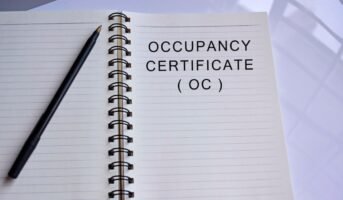Selling a property often involves obtaining a No-Objection Certificate (NOC) from your housing society. This certificate serves as confirmation that the society has no objections to specific requests made by its members, such as carrying out renovations or selling a property. Read on to learn about the necessity of an NOC, the process of requesting it, and steps to take if the society refuses to issue an NOC to the seller.
What is an NOC for property sale?
A No Objection Certificate (NOC) issued by a housing society is an official document that validates the absence of objections from the society regarding its members’ property-related plans. These plans may include selling or transferring ownership of a property, making alterations or renovations, and obtaining a loan against the property. The NOC serves to confirm that the member has met all society rules and regulations and has settled any outstanding dues or obligations. It holds significance as a necessary document, especially for banks, buyers, or government authorities involved in property transactions, ensuring adherence to legal requirements, and facilitating seamless processing.
Is it mandatory to obtain an NOC for property sale?
The necessity of obtaining an NOC from a housing society to sell a property varies depending on the regulations and bylaws of the society. In numerous instances, acquiring an NOC is crucial to guarantee a sale process that is both smooth and legally compliant. This certificate acts as confirmation from the society that the seller of the property has fulfilled all obligations, which includes adhering to the society’s rules and regulations and settling any outstanding dues. Therefore, it is advisable for sellers to seek guidance from the housing society and legal professionals to determine whether an NOC is required for the sale of their property.
Who signs the NOC for property sale?
The NOC for property sale is signed by the chairman or secretary of the Resident Welfare Association (RWA) or housing society. It is the society’s responsibility to issue an NOC after recovering any outstanding dues from the member, who is the seller in this case. In situations where the member urgently needs the NOC, the secretary or chairman can sign the NOC within seven days of receiving the application.
How to obtain an NOC for property sale?
Requesting an NOC from the housing society involves submitting a formal request to the housing society’s chairman or secretary. In the letter, you need to clearly state the purpose of the request and provide necessary details such as membership details and property address. It is essential to mention the urgency of the NOC, if applicable, and to enclose any required documents or clear outstanding dues, if any. Submit the letter and any prescribed application fees to the society’s office. Once submitted, regularly follow up to ensure timely processing of your NOC request.
What to do if a housing society refuses to issue an NOC for property sale?
If a housing society refuses to provide an NOC, the seller can consider the following actions:
- Consult the buyer’s bank: The seller may approach the buyer’s bank to understand the legal requirement for obtaining an NOC for a home loan, which may help clarify the necessity of the NOC.
- Serve a show cause notice: The seller can issue a show cause notice to the housing society, questioning the refusal to grant the NOC.
- Seek assistance from deputy registrar: If the housing society fails to provide written reasons for refusing an NOC even after receiving the show cause notice, the seller can lodge a complaint directly with the deputy registrar for further action.
- File a complaint: In the case of a cooperative housing society, you have the option to file a complaint with the cooperative registrar, urging for the provision of the NOC. Alternatively, a complaint can be lodged with the society’s registrar, requesting intervention to compel the society to issue an NOC.
- File a police complaint: In addition to lodging a complaint with the registrar of the housing society, you can also file a complaint with the police against the society’s managing committee.
- Legal recourse: As a last resort, if all other avenues have been exhausted, the seller may choose to seek resolution through the consumer court to compel the housing society to issue an NOC.
When can a housing society refuse to issue an NOC for property sale?
The only reason for which a housing society can legally refuse to issue an NOC for property sale is if you have not cleared any unpaid dues. If all your dues are clear, the society is bound by law to provide you with an NOC.
Housing.com POV
Navigating the process of selling a property often entails obtaining a No Objection Certificate (NOC) from one’s housing society. This certificate is pivotal in confirming the society’s lack of objections to specific property-related plans, such as selling or renovating a property. Understanding the necessity of an NOC, the procedures for obtaining it and the steps to take if the society refuses to issue it is crucial for sellers. By familiarising yourself with the intricacies of obtaining an NOC and the available recourse if faced with a refusal, you can ensure a smoother and legally compliant property transaction process. Ultimately, clear communication with the housing society, adherence to regulations and seeking legal advice when necessary are integral in facilitating a successful property sale journey.
FAQs
What is an NOC from a housing society for property sale?
A No Objection Certificate (NOC) is an official document issued by a housing society confirming that it has no objections to specific property-related plans, such as selling or renovating a property. It is necessary to ensure a smooth and legally compliant property transaction process.
How can I request an NOC from my housing society when selling my property?
To request an NOC, you need to submit a formal request to the housing society's chairman or secretary. In the request letter, clearly state the purpose and urgency, provide necessary details such as membership information and property address, and enclose any required documents or clear outstanding dues.
What should I do if my housing society refuses to issue an NOC for selling my property?
If faced with a refusal, you can consider several steps: consult the buyer's bank to understand the necessity of the NOC, serve a show cause notice to the housing society, seek assistance from the deputy registrar, file a complaint with the cooperative registrar of society's registrar, and as a last resort, seek legal recourse through the consumer court.
Are there any circumstances under which a housing society can legally refuse to issue an NOC for property sale?
The only legally permissible reason for a housing society to refuse an NOC is if the seller has outstanding dues. If all dues are clear, the society is obligated by law to provide the NOC.
How can I ensure a successful property sale while navigating the NOC process?
To ensure a successful property sale journey, it is crucial to communicate clearly with the housing society, adhere to regulations, and seek legal advice when necessary.
| Got any questions or point of view on our article? We would love to hear from you. Write to our Editor-in-Chief Jhumur Ghosh at [email protected] |

Dhwani is a content management expert with over five years of professional experience. She has authored articles spanning diverse domains, including real estate, finance, business, health, taxation, education and more. Holding a Bachelor’s degree in Journalism and Mass Communication, Dhwani’s interests encompass reading and travelling. She is dedicated to staying updated on the latest real estate advancements in India.
Email: [email protected]











